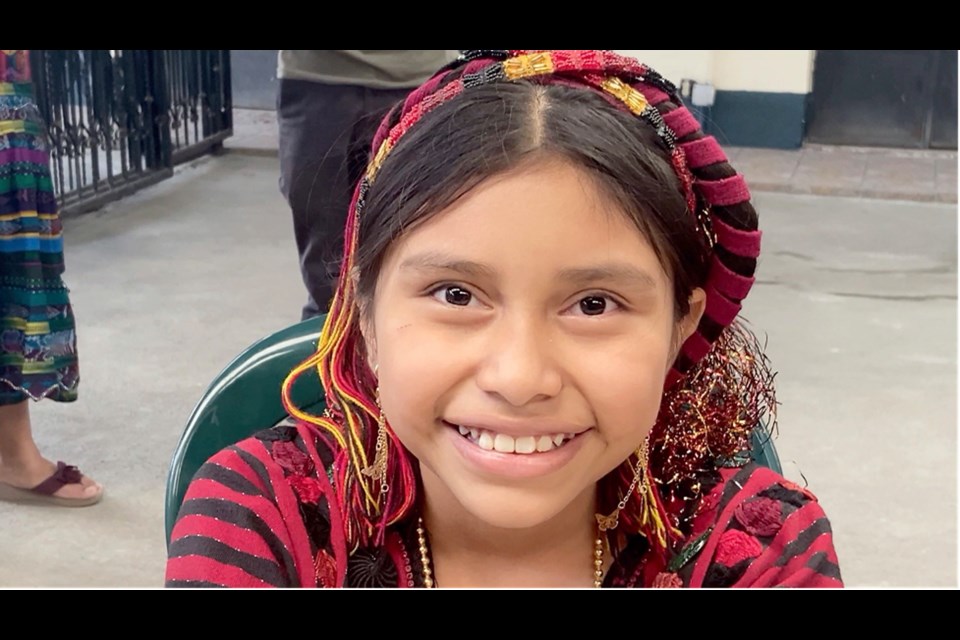Peter Gumbrell was recently part of the Paso Por Paso group, based in Orillia, that visited Guatemala. This is his first-person account of the experience.
Riding in the back of a pickup truck down steep and bumpy roads with two young pre-school teachers was definitely a highlight of my recent trip to Guatemala. I had thought it would be a good opportunity to take photos of the stunning scenery in that area, but I found myself holding on with two hands most of the way. The two women teachers with me were much more relaxed with this means of transport.
I was in Guatemala with others from the local not-for-profit organization, Paso Por Paso. This was the first visit by any group members since the start of the pandemic. While I have visited Guatemala before as a tourist, being part of this project gave me a week of rich and rewarding experiences.
Paso Por Paso is a group that has provided financial support to, and personal collaboration with, people in the small and remote town of Tierra Linda and surrounding area.
Working with an umbrella not-for-profit organization, Natun Guatemala, Paso Por Paso has helped with school improvements, individual student sponsorships and capital to support entrepreneurship programs for women.
This visit was an opportunity for some of the directors to renew friendships, review the status of the current programs and to consider possible future fundraising projects. In addition, for me it was a chance to learn more of the people and the culture and to meet both staff and residents of the area.
Almost everyone in Tierra Linda is Maya. With 22 local languages, the Maya are a majority in Guatemala. While they are well represented in local government, historical forces and institutional impediments continue to prevent more involvement in national politics and, therefore, to equal access to financial and material resources.
In Tierra Linda, the local language is Kaqchikel and this is spoken by everyone, and most also speak Spanish.
We began our week in Panajachel, where the offices of Natun Guatemala are located. The majority of the staff there are also Maya. We received presentations from program directors about the current situation in the three program areas: education, nutrition and health, and economic development.
We learned about the new pre-school program from two clearly capable and dedicated teachers, about the need for nutritional support for some of the young children and also about the disruption to education, in general, caused by the pandemic.
When visiting the pre-school at Tierra Linda, we watched part of an embroidery class given to some of the mothers. (The pre-school buildings are beginning to serve the purpose of a community centre.) These classes are part of the economic development program in which women are able to learn a skill and, if they choose to start their own business, they can receive a “microloan” and also obtain some business training.
For me, though, the meetings we had with students and their mothers were the most instructive and noteworthy. Even with my limited Spanish, I could clearly see that education is considered to be of great value. Several students told me of their hopes for the future: to be a nurse, an architect, a lawyer, and each of these will require several years of university.
Any years of school beyond Grade 8 can be a hardship for families as this will mean a school outside of Tierra Linda, and university can be very costly. This is why the support that Paso Por Paso provides is so important; it allows for an education for some students that otherwise would not be possible.
One student had practised the phrase “Welcome to Guatemala” in English and proudly said this to us. Her mother, through an interpreter, thanked us for returning and for the support provided in the past. Her words were echoed by other mothers we met that day and later.
They talked of the troubles encountered during the pandemic but also acknowledged that the pandemic was worldwide and that Canadians had also suffered.
Each mother received a food package from Paso Por Paso as they left. I watched keenly as they tied the heavy pack inside the colourful blankets they carry with them and hoisted them on their heads for the long walk home.
The most unforgettable moment of the trip for me was our visit to the school at Tierra Linda. When we arrived, the whole school was there to greet us, with the students cheering and showering us with confetti. The school staff and school board were also there and, while the principal greeted us warmly with a short speech, students presented us with flowers and other decorations. Later we met with all the school staff and the school board.
The principal offered thanks to the group for its ongoing friendship and support. Later we toured part of the school and the principal showed us four classrooms in need of reconstruction. The roofs leak and during the rainy season (six months of the year) the classrooms cannot be used consistently.
At the end of our week there, I was left with a profound respect for the people we met: the workers at Natun Guatemala, the pre-school teachers, and the teachers at the school but mainly for the families, the students and their mothers.
The Maya people, despite their lack of resources and the hardships that they face, carry themselves with grace and dignity, with evident love for each other and consideration for others.
It was both a pleasure and an honour to spend so much time with them.
For more information, visit pasoporpaso.ca or the Paso Por Paso Facebook page.
